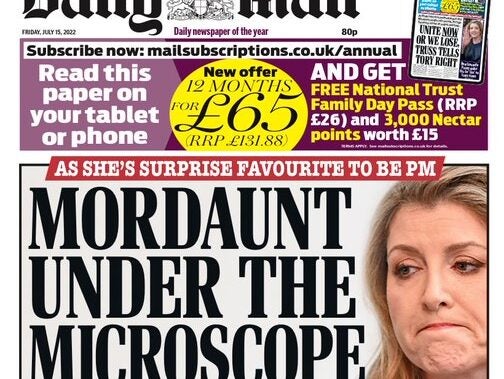
Conservative Party leadership candidate Penny Mordaunt saw the most negative headlines from pro-Tory national newspapers during the MP ballots, according to new analysis of hundreds of articles.
Mordaunt had been ahead of ultimate victor Liz Truss in the early part of the race, coming consistently second behind Rishi Sunak, until the final vote of the parliamentary party on 20 July.
The new analysis by press regulation reform campaign group Hacked Off, exclusively shared with Press Gazette, shows Mordaunt’s strong showing in the first MP ballot on 13 July was followed by a flurry of negative stories, with the Daily Mail in particular throwing its weight behind Truss.
Hacked Off counted positive and negative stories about each of the Conservative leadership in The Sun, the Daily Mail, The Telegraph and The Times in print and online between Boris Johnson’s resignation on 7 July and the final MP ballot on 20 July.
It analysed references to the candidates and categorised them according to whether they were deemed likely to give the ordinary reader a positive, negative or neutral opinion of them.
The four newspapers were chosen because they have a record of supporting the Conservative Party in general elections for at least the past ten years. The Daily Express was discounted because it supported UKIP in the 2015 election.
Of the four titles, The Times endorsed Sunak once the final two candidates were chosen, the Mail and Telegraph were pro-Truss and The Sun did not endorse any candidate.
Hacked Off suggested that if the negative coverage of Mordaunt swung MPs’ votes towards Truss instead of her, it could have changed the entire outcome by stopping her from reaching the final two with Sunak.
Mordaunt was the only candidate in the MP ballot stage to have a net negative response from each of the four newspapers. By comparison, Truss had a negative score only from The Times, Sunak was positive from The Sun and The Times, and Badenoch had a net positive score from each newspaper.
Mordaunt had a net number of positive references in the two weeks of the study of -60 compared to Truss’ 26. Badenoch, who was eliminated in the penultimate round of MP votes, had the most positive references with a net number of 35.
The analysis showed the extent of the Daily Mail's support for Truss who had a net positivity score of 30 compared to -35 for Mordaunt (92% negative articles) and -28 for Sunak (82% negative).
Hacked Off, which said the Daily Mail ran the "most partisan campaign", said in a statement: "The fact that Mordaunt ultimately lost out to the Mail’s favoured candidate Liz Truss, who has gone on to win the election as Prime Minister, shows how powerful newspapers still are in politics."
The Sun was also net negative against Mordaunt, although to a lesser extent with a net score of -5, and positive towards Truss (5) - although it was more positive about Badenoch (16).
The Times was the most positive about Sunak, with a net positivity score of 8, and most negative towards Truss, on -10.
Finally The Telegraph was again most negative towards Mordaunt, with a net positivity score of -14, and most positive towards Badenoch, on 10.
Email pged@pressgazette.co.uk to point out mistakes, provide story tips or send in a letter for publication on our "Letters Page" blog
